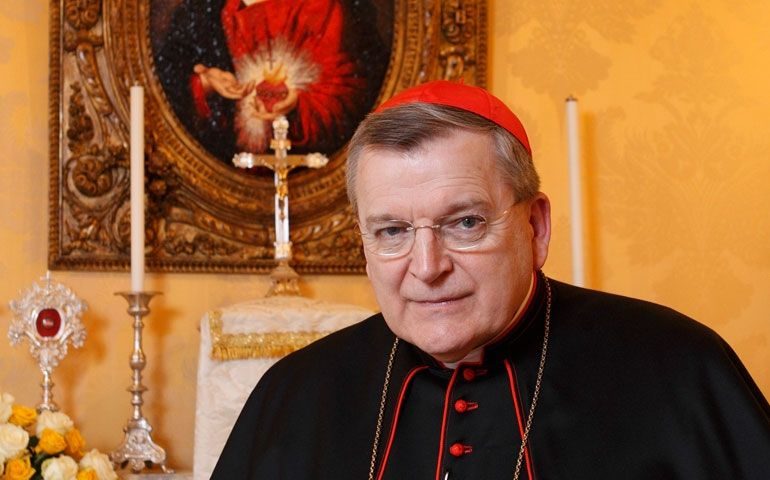Pope’s Confusing Teaching Rejected, Cardinals Issue Declaration on Marriage

Restoring Courtship in a Hook-Up Culture: ‘The Dating Project’ Based on a College Class
April 11, 2018
350 Student Groups Will Join Pro-Life Walkout to Protest Abortion
April 11, 2018
By Michael W. Chapman, CNSNews, April 10, 2018

 In response to the ever-growing confusion and scandal in the Catholic Church created by Pope Francis’s ambiguous teachings on divorce, remarriage, and adultery, among other other issues, several cardinals, bishops, priests, and lay faithful issued a “final declaration” on April 7 in Rome that reaffirms the 2,000-year-old teaching of the church on these matters.
In response to the ever-growing confusion and scandal in the Catholic Church created by Pope Francis’s ambiguous teachings on divorce, remarriage, and adultery, among other other issues, several cardinals, bishops, priests, and lay faithful issued a “final declaration” on April 7 in Rome that reaffirms the 2,000-year-old teaching of the church on these matters.
Pope Francis (YouTube)
The six-point profession of faith entitled, “Therefore we testify and confess,” as reported by EWTN’s National Catholic Register, was released at the end of a conference in Rome, based on the theme, “Catholic Church: Where are you heading? Only a blind man can deny there is great confusion in the Church.”
 That conference was organized by friends of the late Cardinal Carlo Caffarra, the former archbishop of Bologna, Italy, who died in September, reported The Register.
That conference was organized by friends of the late Cardinal Carlo Caffarra, the former archbishop of Bologna, Italy, who died in September, reported The Register.
U.S. Cardinal Raymond Leo Burke, who serves on the Vatican’s highest court. (YouTube)
Cardinal Caffarra, when alive, had asked Pope Francis to clarify his teaching on remarriage and Communion, as presented in the morally confusing papal letter Amoris Laetitia. The Pope did not respond to him or to other cardinals who asked for clarity. Nor has he responded to a similar query, a “filial correction,” issued by more than 200 Catholic theologians, priests, and laity.
In Amoris Laetitia, Pope Francis implies that some people living in serious sin, such as adultery — the divorced and remarried under church law — can, through “discernment,” receive Holy Communion at Mass. Pope Francis calls this “the help of the sacraments” in his letter. However, the Church has always taught that persons in a state of serious sin, mortal sin, must first go to Confession, truly repent of their sin, and strive to not commit the sin again before they can receive Communion.
If a person has no intention of leaving the situation of adultery, his repentance is false, the Confession is not valid, and if he then takes Communion, he commits the sin of sacrilege. Pope Francis is suggesting that some people in these adulterous situations can, after “discernment” with a priest, receive Communion and that this will somehow help them to live holier lives.

Cardinal Joseph Zen, coadjutor bishop of Hong Kong. (YouTube)
The bishops of Buenos Aires have adopted this intepretation, as have several bishops in Germany, Malta, Portugal, New Jersey, San Diego, and Chicago, among other places. However, other bishops have rejected that interpretation, or simply reaffirmed the Church’s traditional teaching — bishops from Poland, some in Germany and Italy, in Philadelphia and in Springfield, Illinois.
Pope Francis has said that the position of the Buenos Aires bishops is the only correct one — “there are no other interpretations.” He had their guidelines on the topic published on the Vatican website and in the Acta Apostolicae Sedis, essentially making them official.
All of this has sparked widespread confusion in Church. Thus, the “Final Declaration” issued on Saturday, April 7. The document, whose supporters include Cardinal Raymond Burke, Cardinal Walter Brandmuller, Bishop Athanasius Schneider, Cardinal Joseph Zen, and Marcello Pera, former president of the Italian Senate, reads, in part, as follows:

Marcello Pera, former head of the Italian Senate. (YouTube)
“Due to contradictory interpretations of the Apostolic Exhortation Amoris laetitia, growing discontent and confusion are spreading among the faithful throughout the world.
“The urgent request for a clarification submitted to the Holy Father by approximately one million faithful, more than 250 scholars and several cardinals, has received no response.
“Amidst the grave danger to the faith and unity of the Church that has arisen, we baptized and confirmed members of the People of God are called to reaffirm our Catholic faith.
“… Therefore, in accordance with the authentic tradition of the Church, we testify and confess that:
“1) A ratified and consummated marriage between two baptized persons can be dissolved only by death.

Pope Benedict XVI. (YouTube)
“2) Therefore, Christians united by a valid marriage who join themselves to another person while their spouse is still alive commit the grave sin of adultery.
“3) We are convinced that there exist absolute moral commandments which oblige always and without exception.
“4) We are also convinced that no subjective judgment of conscience can make an intrinsically evil act good and licit.
“5) We are convinced that judgment about the possibility of administering sacramental absolution is not based on the imputability of the sin committed, but on the penitent’s intention to abandon a way of life that is contrary to the divine commandments.
“6) We are convinced that persons who are divorced and civilly remarried, and who are unwilling to live in continence, are living in a situation that is objectively contrary to the law of God, and therefore cannot receive Eucharistic Communion.”
Contray to the claims of the bishops of Buenos Aires, the Catechism of the Catholic Church teaches, “Today there are numerous Catholics in many countries who have recourse to civil divorce and contract new civil unions. In fidelity to the words of Jesus Christ – ‘Whoever divorces his wife and marries another, commits adultery against her; and if she divorces her husband and marries another, she commits adultery’ the Church maintains that a new union cannot be recognized as valid, if the first marriage was. If the divorced are remarried civilly, they find themselves in a situation that objectively contravenes God’s law.
“Consequently, they cannot receive Eucharistic communion as long as this situation persists. For the same reason, they cannot exercise certain ecclesial responsibilities. Reconciliation through the sacrament of Penance can be granted only to those who have repented for having violated the sign of the covenant and of fidelity to Christ, and who are committed to living in complete continence.” (1650)

Pope St. John Paul II. (YouTube)




